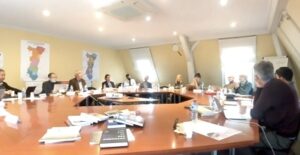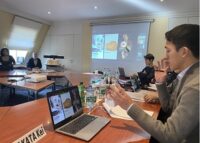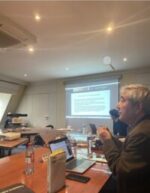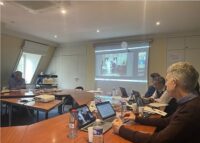Workshop Report The 5th EU-Japan Young Scholars Workshop in Alsace Japanese Transnationalism and Empire (November 4th – 6th, 2022)2023/01/12
Workshop Report
The 5th EU-Japan Young Scholars Workshop in Alsace
Japanese Transnationalism and Empire
■Date : November 4th – 6th, 2022
■Place: CEEJA (France)
■Organizing Committee
・Hosei University Research Center for International Japanese Studies (HIJAS)
・European Center for Japanese Studies in Alsace (CEEJA)
・Consortium for Global Japanese Studies (CGJS)
▶日本語レポートはこちら
The EU-Japan Young Scholars Workshop in Alsace is an international conference co-organized by the Hosei University Research Center for International Japanese Studies, the European Center for Japanese Studies in Alsace (CEEJA), and the Consortium for International Japanese Studies. This workshop invites keynote speakers and researchers early in their careers from Europe and Japan to discuss a specific workshop theme in-depth over the course of several consecutive days. This year’s conference was held at CEEJA from Friday, November 4th to Sunday, November 6th and considered the theme of “Japanese Transnationalism and Empire.” While the conference was held virtually over the past two years due to the pandemic, we managed to invite in-person presenters and commentators to Colmar for a series of intriguing presentations and vibrant discussions for three days this year.
Since 2021, our workshops have focused on transnationalism and Japan (or Japanese studies). Transnationalism can provide a highly critical approach toward area and Japanese studies that fundamentally demolishes their foundations, especially since area studies is a field that directly explores the characteristics of nation-states and their people. To explore the intricate relationship between transnationalism and Japanese studies, we invited keynote speakers from the U.S. and Europe to lecture about the theory of and approaches to transnationalism. We also invited a wide variety of presenters who engaged in projects that explored Japan from a transnational lens. By employing this transnational approach, we were able to grasp another side of “Japan” that differs from a perspective based on nation-state framework (▶please see last year’s report for details).
In 2021, we found transnationalism to be a profound topic that requires further discussion in future workshops. This year, we decided to continue our discussions on the topic, while focusing on the issue of power in transnationalism. “Empire” became our workshop’s keyword in order to represent transnationalism’s power structures from a macro perspective. We chose to highlight the concept of “empire” for two reasons. First, it encompasses a long historical period, which allows space for a large range of potential presentations. Second, it embodies the ambiguity of transnationalism, since empires at once expand their power by transcending national borders and resistance against them occasionally takes a transnational form. Thus, we may consider transnationalism as an important source of social power.
We invited two keynote speakers to our workshop this year — Naoki Sakai (Cornell U), returning from last year, and Michael Lucken from INALCO – as well as eight presenters (workshop program). The first day of the workshop, chaired by Kei Takata of Hosei U, was titled “Japanese Empire and Transnational Thoughts” and featured two presentations in the morning and three hours of keynote sessions in the afternoon. The section theme for the second day, which was chaired by Regine Matthias of CEEJA, was “Japanese Empire and European Empires.” It featured four presentations discussing the transnational connections or comparisons between the Japanese empire and European empires. “Japan and Pax-Americana” was the title for the final day’s session, chaired by Hideto Tsuboi of Waseda U, and it showcased two presentations related to Japan and American “empirical” relations and more than two hours of intense discussion to wrap up the workshop.
This year saw a range of fascinating papers that explored Japan through the lens of transnationalism and/or empire (paper abstracts). Tomoki Sakata (Uni Bamberg) presented a philosophical paper that examined how transnationalism (or world nation) can be interpreted via Tetsuro Watsuji’s philosophy. Sakata concluded that while it is possible to extend Watsuji’s ningen-ethics to the concept of world nation, the image of man (ningen) becomes empty, or “contentless,” within the community beyond the nation-state. All other presentations were historical explorations of politics, culture, arts, and images. Beginning from the oldest historical period, presenter Paola Mascio (Hosei U) explored the origin of gambling in early modern Europe and late medieval Japan, and how gambling games, such as hanafuda, were transnationally diffused from Japan to colonial Korea under Japanese colonialism. Presenter Amin Ghadimi(Osaka U)traced the development of “transimperial” terrorist activities during the Freedom and People’s Rights Movement. Ghadimi focused on Fukuda Hideko, a very early women’s rights activist in Japan, and how revolutionary thought from Russia influenced her involvement in planning a terrorist attack in Korea. Presenter Nikolaos Mavropoulos (Hanse-Wissenschaftskolleg) analyzed Japanese and Italian imperialism through a comparative lens. He situated Japan and Italy as late imperialists and argued that, although their basic ideology and regions they colonized differed, they had similar economic weaknesses, military vulnerabilities, and demographic problems that drove them to colonize. Presenter Anna Shimomura captured the characteristics of Japanese imperialism from a literary studies standpoint. She explored the transnational impact of Polish writer and first vital critic of Western imperialism, Joseph Conrad, on Japanese novelists. Shimomura especially focused on depicting the ambivalence of Japanese imperialism portrayed in the writings of Jiro Osaragi. Presenter Jasmin Rückert (Uni Düsseldorf) discussed the Japanese empire’s propaganda within colonial lands by analyzing magazines published in Manchukuo and exploring the way in which the Japanese empire generated an image of “diversity” with photos of Japanese migrants, Chinese “coolies,” and other ethnic minorities from the region. Presenter Jana Aresin (Uni Erlangen-Nürnberg) also offered a case study involving Japanese magazines, which focused on the representation of women in Japan under U.S. Occupation. In particular, she carefully analyzed how Japanese women were portrayed as vital actors in the promotion of the construction of a new democratic Japan. Finally, presenter Kimihiko Nakamura (Uni Heidelberg) explored the transnational practices of Japanese painters who have moved between different “empires” throughout their careers. He especially highlighted Kenzo Okada and Minoru Kawabata, who were painters engaged in war painting in Manchuko and South East Asia during the Second World War and moved to the U.S. to further develop their careers after the war’s end.
From these diverse presentations in the fields of philosophy, political and cultural history, and literary and art studies, I reconfirmed that transnationalism is an approach that helps accommodate a variety of topics. At the same time, depending on the period of focus (e.g., modern or premodern) and the subject of analysis (people, information, images, artwork, etc.), the meaning of transnationalism may differ. In fact, as explained later, potential theoretical and methodological issues were one of the focal points during our roundtable discussions. Nevertheless, by incorporating the concept of the empire into transnationalism, we were able to successfully tackle the concept of power in transnationalism. This included how power controls or portrays transnational mobilities (Rückert), how people resist empire through transnational actions and imaginations (Ghadimi), and how people skillfully navigate their life by moving transnationally under the rise and fall of different empires (Nakamura).
Another aim of this year’s workshop was to learn broadly about the theme of power in transnationalism and the diverse approaches to Japanese studies via keynote lectures. Last year, Naoki Sakai provided an inspirational talk entitled “Internationality and Transnationality: Translation and Area Studies,” which discussed transnationalism in depth. This year, we asked him to present his latest book, The End of Pax Americana: The Loss of Empire and Hikikomori Nationalism, which was published in January 2022 by Duke University Press (the Japanese version was published in 2017 by Iwanami Shoten). This book is a collection of essays and lecture drafts that Sakai published over the past two decades. During his speech, Sakai explained the aim of his book and the four main topics that make up the book’s overall structure: colonialism today and its affects on those who live in postcolonial empires or suzerain states, Pax Americana and Area Studies, the spatial structure of the international world, and the decolonization of knowledge production. He also modestly mentioned the difficulty of providing a coherent narrative for the entire book, given the diversity of the topics covered. Yet, after reading Sakai’s book and listening to his lecture, I found it an intriguing provocative work that discusses a current world in which postcolonial and pax-Americana global orders have been destabilized. It forces us to think about how the knowledge structure of the West and the Rest has become dysfunctional, or at least transformed, over the years and how people, especially those living in past “empires,” are reacting to this change. The concept of hikikomori (those who resign themselves to a lifestyle of reclusive withdrawal) is utilized as one such example.
The second keynote speaker, Michael Lucken, gave a lecture based on his most recent book The Japanese and the War: Expectation, Perception, and the Shaping of Memory, which was published in 2017 by Columbia UP. This book is an English translation of his previous work in French, Les Japonais et la guerre: 1937-1952, which provides a historical account of the “Japanese empire” from the pre-second World War period to the immediate post-war when Japan was incorporated into the pax-Americana order. Lucken’s book and presentation revealed two main aims. The first is to share the Japanese war experience with a French audience. While the U.S. defeated and occupied Japan, Asian countries experienced Japan’s colonialism, and Germany followed a similar path to Japan in the post-war period, France’s relationship with Japan’s war experience was relatively insignificant. In fact, according to Lucken, the topic has nearly been non-existent in the French language. Nonetheless, Lucken’s book goes beyond simply introducing Japan’s war experience to French readers by shedding new light on Japan and its relationship to the war. For example, while predominant periodization of the second World War begins with the Sino-Japanese War in 1937 and ends with Japan’s surrender in 1945, Lucken’s book begins with Japan’s loss of the Pacific front in 1943 and continues until the end of the Allied Occupation in 1952. Being an art historian, Lucken also includes various images in his book, such as photos and posters, to depict a Japanese perspective on the war. In fact, in his keynote lecture, Lucken asserted his desire to avoid a unification of history, emphasizing the importance of writing multiple histories by shifting constructed dominant narratives and memories away from the center.
Lucken’s approach brings fresh insights to Japan’s war history in a way that shifts the mainstream historical narrative. I found this unique intervention successful due to the combination of his deep knowledge of Japanese history in Japanese and anglophone academic circles and his position as a scholar in France, which remains a relatively marginal area in the field of Japanese war history. Sakai’s insights and perspectives stem from a similarly mixed positionality and pool of knowledge. As Sakai himself admitted in his lecture, his ideas are largely influenced by his unique transnational experience as a Japanese native based in the U.S. who occasionally interacts with Asian and European circles. In this way, although the two books introduced in this year’s keynote speeches may not discuss transnationalism directly, it was fascinating to hear how the authors’ transnational experiences served as a fundamental source for their ideas and approaches.
Many issues were discussed during the roundtable sessions, including eurocentrism, the decline of “empire” and its effects, and international approaches to Japanese studies. By far, the most vehement discussion was on the issue of transnational or transnationalism, our workshop’s keyword over the past two years. Transnationalism is indeed a controversial concept, and its interpretation differs by discipline and individual, as was made clear by the diverse presentations at this year’s workshop. Also, it is important to note that transnationalism is not always a familiar concept in all academic spheres around the world. During the final day’s roundtable discussion, we had a vibrant discussion about this issue, which involved two different interpretations of what transnationalism meant. The first view understood transnationalism as a normative or political project, while the other took a methodological perspective that conceptualizes transnationalism as a contemporary and historical phenomena that cuts across national borders. To be sure, both aspects are interrelated and inseparable in the social sciences and humanities. Nevertheless, for the sake of clarity, we may call these views a normative perspective and an analytical perspective, respectively.
A normative perspective sees the potential in transnationalism to overcome the nation-state, which is based on strict and clear borders between different countries. Employing transnationalism with a critical view toward nation-states reveals the malicious side of “nation,” including state violence and the reclusiveness of nationalism. Such arguments were largely shared by scholars based on philosophy and social thoughts. The analytical perspective, on the other hand, is one employed generally by scholars from historical studies and other disciplines based on empirical studies. Argued as methodological nationalism, modern humanity and the social sciences have been based profoundly on a nation-state framework. Therefore, although this world has been created by numerous practices that cut across national borders, these practices were largely missing in past empirical studies. As such, the analytical perspective has become an approach that enables us to capture and depict new aspects of our world that have long been overlooked.
One aspect that the normative and analytical perspectives share is the premise that the transnational is, in fact, “national.” In other words, it is precisely the relationship with the “national” that makes the significance of transnationalism apparent. In this sense, our workshop has helped us reconfirm the importance of exploring transnationalism through area and Japanese studies, and how deeply transnationalism is embedded in the nation-state framework.
Overall, this year’s workshop hosted several intriguing presentations and vibrant discussions exploring the theme of transnationalism. Compared to the past two virtual years, I believe that our success this year arose in part from our face-to-face format. Other participants, including Regine Mathias, vice president of CEEJA and this year’s workshop host, voiced similar opinions. The advantage of a face-to-face workshop is not only manifested in its performance-heavy “front stage,” but also facilitates the vital “backstage” networking and down time that takes place during meals and breaks. Combining front and back stages, our transnational workshop becomes a space where participants can compare styles and trends of research and learn about active scholars in various parts of the world to foster burgeoning ties that may flourish in the future.
Kei Takata (Hosei University)
 |

|
 |
 |
 |
 |

